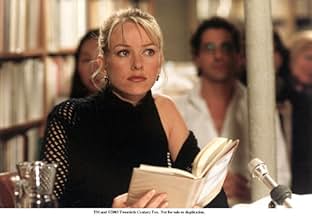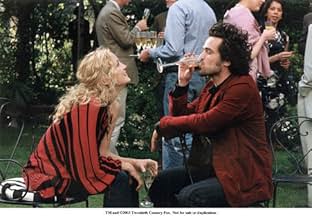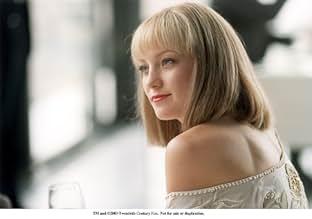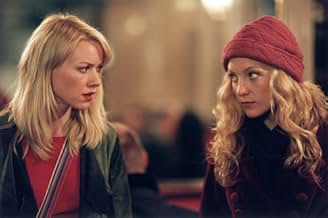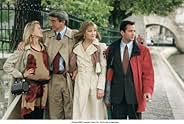Le divorce
- 2003
- Tous publics
- 1h 57m
IMDb RATING
4.9/10
12K
YOUR RATING
French vs. American social customs and behaviors are observed in a story about an American visiting her sister and French brother-in-law and niece in Paris.French vs. American social customs and behaviors are observed in a story about an American visiting her sister and French brother-in-law and niece in Paris.French vs. American social customs and behaviors are observed in a story about an American visiting her sister and French brother-in-law and niece in Paris.
- Director
- Writers
- Stars
- Awards
- 2 wins total
- Director
- Writers
- All cast & crew
- Production, box office & more at IMDbPro
Featured reviews
After viewing the unfortunate "Golden Bowl" (also by James Ivory) the day before, an exposure to "Le Divorce" was certainly a refreshing sip of champagne. This may be the first James Ivory movie I've seen where I forgot to look at the sets (unlike Ivory's other French venture, "Jefferson in Paris"). This is mostly due to the depth of certain actors and the fact that this time Ivory decides to close in on them rather than frame them. When the book came out, as an American living in Paris for 30 years, I avoided reading another set of American observations on everything French that foreign residents here hate, and I can't say that the movie avoids the pitfalls of throwing around generalities. Yet this is kept to an astonishing minimum, perhaps because few of the main characters really consider themselves typical representatives of their native country. Instead of a plethora of reflections coming out of their mouths, "the French are like this, the Americans are like that," the viewer can actually draw his own conclusions about which country has the "nicest" people and the place of formality when it comes to private matters. After all, would the story have been that much different if it had dealt with class differences in New York City? The characters who do tend to generalize are perhaps the least involved in what is going on. They form the real "décor" of the film, rather than the wallpaper and polished furniture, although these elements certainly haven't been omitted.
I find it strange that the two most interesting actors are supposed to belong to the subplot, Kate Hudson and Thierry L'Hermitte. The latter is currently being wasted in his late middle age in French films, and, like Louis Jourdan in "Gigi," manages to bring a little subtle something extra to the most stereotyped part in the film. I'd like to see him extend what he has done here, if any producer or director can be bothered.
The film had such a short run in France that I missed seeing it in a movie theater, and it was dismissed by most French critics on its release like the way that some of the American characters are dismissed by their French counterparts in the film itself. It would be a shame to overlook this light but not lightweight effort, for it has a surprisingly natural charm and raises interesting questions about how much the culture that forms our conditioning influences our very humanity.
I find it strange that the two most interesting actors are supposed to belong to the subplot, Kate Hudson and Thierry L'Hermitte. The latter is currently being wasted in his late middle age in French films, and, like Louis Jourdan in "Gigi," manages to bring a little subtle something extra to the most stereotyped part in the film. I'd like to see him extend what he has done here, if any producer or director can be bothered.
The film had such a short run in France that I missed seeing it in a movie theater, and it was dismissed by most French critics on its release like the way that some of the American characters are dismissed by their French counterparts in the film itself. It would be a shame to overlook this light but not lightweight effort, for it has a surprisingly natural charm and raises interesting questions about how much the culture that forms our conditioning influences our very humanity.
The performances are terrific, Kate Hudson proves that she is the actress that Goldie Hawn never was, and it is always good to see Leslie Caron looking her age and looking great. Now, the matter of the plot has been raised and the consensus so far is that it is a bag of clichés dumped into a blender and then poured out on film.
True. But, the book was no great shakes either and the screenplay simply has not risen above its origins.
I enjoyed Le Divorce for its cynicism and its predictability, frankly. It is nice every now and then to see a movie that elicits a sour chuckle rather than a guffaw or a shriek, and this is one of them.
True. But, the book was no great shakes either and the screenplay simply has not risen above its origins.
I enjoyed Le Divorce for its cynicism and its predictability, frankly. It is nice every now and then to see a movie that elicits a sour chuckle rather than a guffaw or a shriek, and this is one of them.
James Ivory is not exactly a politically orientated film maker, but it took some courage, and it was a politic message releasing a film about Americans living in Paris, and the culture clash between American and French in 2003. Although his film is more about family relations and cultural perception, it says a lot about humans being more important in the relations between two nations than their leaders politics.
Not that the relations in the film are that soft. I know quite well both American and French mentalities, and I appreciate the ironic mirror this film puts in the faces of the two peoples. There is certainly a certain dose of stereotype in the approach, but still the characters are well built, they act with logic most of the time, and some good acting from a bi-lingual team
helps a lot. Paris is still the best location to pick for a film ever. The plot is a little bit too long, and the end suffers from hollywooditis, but overall it is a satisfying cinema experience. I do not like the romantic genre too much, but it was better than I expected. 7 out of 10 on my personal scale.
Not that the relations in the film are that soft. I know quite well both American and French mentalities, and I appreciate the ironic mirror this film puts in the faces of the two peoples. There is certainly a certain dose of stereotype in the approach, but still the characters are well built, they act with logic most of the time, and some good acting from a bi-lingual team
helps a lot. Paris is still the best location to pick for a film ever. The plot is a little bit too long, and the end suffers from hollywooditis, but overall it is a satisfying cinema experience. I do not like the romantic genre too much, but it was better than I expected. 7 out of 10 on my personal scale.
"Le Divorce" fails. Despite the beauty of the locales and the talent of the lead actors, the director couldn't decide if this is a Parisian comedy or an adult tale of marital discord gone horrifically askew.
The interaction between the two female leads is good-half-sisters and true soulmates. But their romantic and marital complications come too fast with too little depth and the film is on a train wreck in the making.
And suave, affluent, cheating Frenchmen are a stale staple of these movies. Nothing new or interesting here.
Too bad.
4/10.
The interaction between the two female leads is good-half-sisters and true soulmates. But their romantic and marital complications come too fast with too little depth and the film is on a train wreck in the making.
And suave, affluent, cheating Frenchmen are a stale staple of these movies. Nothing new or interesting here.
Too bad.
4/10.
Romantic dramas and comedies are not usually my thing, although I admit they can be interesting. Despite myself, I found I liked The Bridges of Madison County (1995), for example. So also with this one: a nice mixture of irony, wry humour, and culture clash (American vs French) all topped off with some murder and financial skullduggery.
There's a large cast of characters, but I'll confine most of my comments to the four main players: Kate Hudson as Isabel Walker, Naomi Watts as her sister, Roxeanne, married to Charles-Henri played by Melvil Poupaud and Isabel's aging lover, Edgar Cosset, played with exquisite panache by Theirry Lhermitte.
The story begins as Charles-Henri is leaving Roxeanne (and his daughter) for another woman, Magda (Rona Hartner), just as Isabel is arriving, from USA, to assist Roxeanne. Essentially, Charles-Henri wants a divorce, but Roxeanne refuses. And for much of the resulting interaction between the couple, that impasse remains. In the meantime, Isabel settles in with Roxeanne and, through the family connections meets Edgar (who is Charles-Henri's uncle) and agrees to become his lover.
The divorce battle gets worse as Roxeanne discovers the inequalities that exist in French law regarding marriage settlements. Relationships sour even more between the two, and now compounded by the growing dispute about a La Tour painting owned by Roxeanne's family but which Charles-Henri now half-claims as part of any divorce settlement. Further drama ensues when Tellman (Mathew Modine) shows up, ranting to Roxeanne about Charles-Henri's seduction of Magda, Tellman's wife.
And, in and out of that mess, Isabel becomes more involved with Edgar, much to the annoyance of Edgar's family but, trust the French to be very civilized about Edgar's affairs and the arrival of Roxeanne's parents and brother (Sam Waterston, Stockard Channing and Thomas Lennon, respectively) who have come to support Roxeanne during her difficult time and, just quietly, to help torpedo Charles-Henri's grab for the La Tour art piece, now valued at multi-millions.
The resolution of all these affairs is competently contrived with many scene changes as the plot interweaves between the two couples, one seeking divorce, the other eventually seeking a divorce of a different kind: as Edgar says to Isabel, finally: "I'm too old for you." And, through the latter half of the story, the American and French families intermingle, giving rise to some delicious moments of that humour and irony already mentioned.
The denouement is predictable, but still enjoyable, and marred only by Mathew Modine's somewhat overacted deranged husband; still, his intervention is instrumental and provides the only real suspenseful moments in an otherwise conventional divorce story. The use of Glenn Close, playing Olivia Pace, as a quasi-mentor for Isabel assists with the story development with Edgar and adds some further touches of irony; however, it added little to the story, as a whole.
As you might expect from an Ivory production, the cinematography, editing, and sound are top notch. And the script, although also somewhat predictable, still shows some moments of brilliance; the lunches and dinners with both families in situ were, for me, a real joy to savour. The acting, apart from Modine, is uniformly very good to excellent. This was the first time I'd seen Kate Hudson on the screen and I think she did well opposite Lhermitte. Watts is always worth watching, as are Channing and Close. And, I was very pleasantly surprised to see Leslie Caron once again, as Edgar's mother.
However, with a lot of sub-titles, some people will be turned off from an otherwise English-speaking film, despite the French actors often lapsing into that language. Being a bit of a Francophile, however, I just found it all quite delightful.
There are some mild and brief sex scenes, and nothing offensive, even for adolescents. It's not a film, however, for those who like action/thrillers.
There's a large cast of characters, but I'll confine most of my comments to the four main players: Kate Hudson as Isabel Walker, Naomi Watts as her sister, Roxeanne, married to Charles-Henri played by Melvil Poupaud and Isabel's aging lover, Edgar Cosset, played with exquisite panache by Theirry Lhermitte.
The story begins as Charles-Henri is leaving Roxeanne (and his daughter) for another woman, Magda (Rona Hartner), just as Isabel is arriving, from USA, to assist Roxeanne. Essentially, Charles-Henri wants a divorce, but Roxeanne refuses. And for much of the resulting interaction between the couple, that impasse remains. In the meantime, Isabel settles in with Roxeanne and, through the family connections meets Edgar (who is Charles-Henri's uncle) and agrees to become his lover.
The divorce battle gets worse as Roxeanne discovers the inequalities that exist in French law regarding marriage settlements. Relationships sour even more between the two, and now compounded by the growing dispute about a La Tour painting owned by Roxeanne's family but which Charles-Henri now half-claims as part of any divorce settlement. Further drama ensues when Tellman (Mathew Modine) shows up, ranting to Roxeanne about Charles-Henri's seduction of Magda, Tellman's wife.
And, in and out of that mess, Isabel becomes more involved with Edgar, much to the annoyance of Edgar's family but, trust the French to be very civilized about Edgar's affairs and the arrival of Roxeanne's parents and brother (Sam Waterston, Stockard Channing and Thomas Lennon, respectively) who have come to support Roxeanne during her difficult time and, just quietly, to help torpedo Charles-Henri's grab for the La Tour art piece, now valued at multi-millions.
The resolution of all these affairs is competently contrived with many scene changes as the plot interweaves between the two couples, one seeking divorce, the other eventually seeking a divorce of a different kind: as Edgar says to Isabel, finally: "I'm too old for you." And, through the latter half of the story, the American and French families intermingle, giving rise to some delicious moments of that humour and irony already mentioned.
The denouement is predictable, but still enjoyable, and marred only by Mathew Modine's somewhat overacted deranged husband; still, his intervention is instrumental and provides the only real suspenseful moments in an otherwise conventional divorce story. The use of Glenn Close, playing Olivia Pace, as a quasi-mentor for Isabel assists with the story development with Edgar and adds some further touches of irony; however, it added little to the story, as a whole.
As you might expect from an Ivory production, the cinematography, editing, and sound are top notch. And the script, although also somewhat predictable, still shows some moments of brilliance; the lunches and dinners with both families in situ were, for me, a real joy to savour. The acting, apart from Modine, is uniformly very good to excellent. This was the first time I'd seen Kate Hudson on the screen and I think she did well opposite Lhermitte. Watts is always worth watching, as are Channing and Close. And, I was very pleasantly surprised to see Leslie Caron once again, as Edgar's mother.
However, with a lot of sub-titles, some people will be turned off from an otherwise English-speaking film, despite the French actors often lapsing into that language. Being a bit of a Francophile, however, I just found it all quite delightful.
There are some mild and brief sex scenes, and nothing offensive, even for adolescents. It's not a film, however, for those who like action/thrillers.
Did you know
- TriviaThe painting sold before Roxy's LaTour is Claude-Joseph Vernet's "La Nuit, au Port au Clair de Lune", which is in the Louvre's permanent collection.
- GoofsWhen Isabel and Edgar have their last outing together, Isabel is clearly wearing red nail lacquer in the restaurant. When they say goodbye outside, her nails are no longer red.
- SoundtracksQu'est-ce qu'on Attend pour Être Heureux ?
Music by Paul Misraki
Lyrics by André Hornez
Performed by Patrick Bruel and Johnny Hallyday
- How long is The Divorce?Powered by Alexa
Details
- Release date
- Countries of origin
- Official sites
- Languages
- Also known as
- The Divorce
- Filming locations
- Production companies
- See more company credits at IMDbPro
Box office
- Gross US & Canada
- $9,081,057
- Opening weekend US & Canada
- $516,834
- Aug 10, 2003
- Gross worldwide
- $12,991,996
- Runtime
- 1h 57m(117 min)
- Color
- Sound mix
- Aspect ratio
- 2.39 : 1
Contribute to this page
Suggest an edit or add missing content








